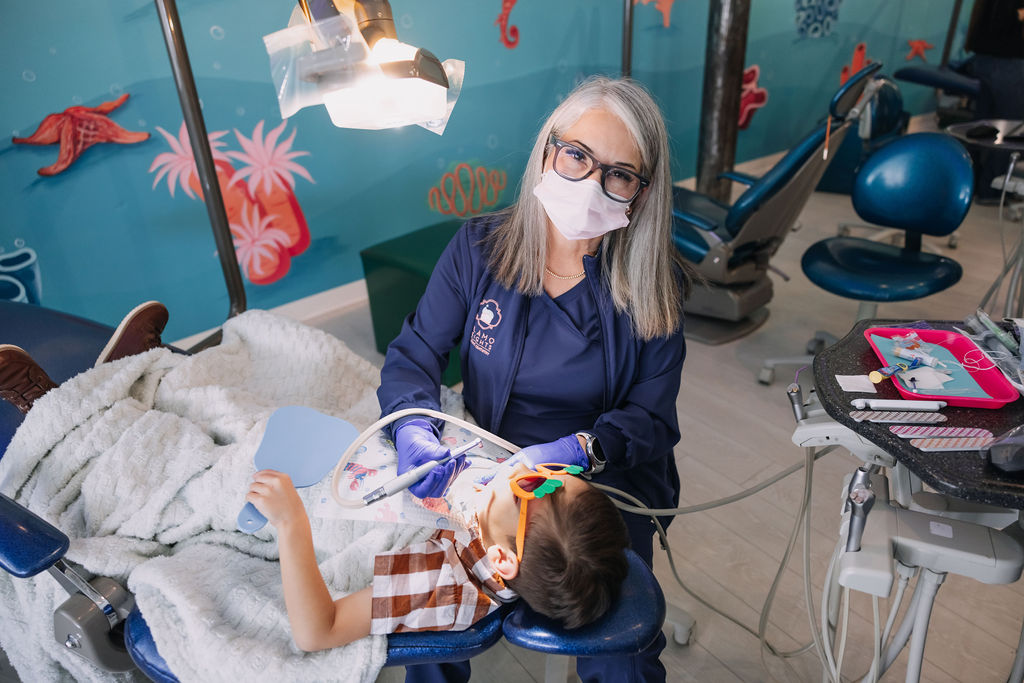Hours
Mon: 8am- 4pm
Tue: 8am- 4pm
Wed: 8am- 4pm
Thu: 8am- 4pm
Closed: Fri - Sun

For some, breastfeeding can be a wonderful time to bond with your child. For others, it can be a painful, frustrating experience that leaves you feeling drained. If you’re wondering if there’s a better way, the answer is yes. Frenectomies can help keep you comfortable and ensure your child is getting proper nutrition while feeding.


Being told that your infant needs a surgical procedure can sound scary, but frenectomies are simple, safe, and effective with minimal aftercare. Plus, with a conservative approach to pediatric dentistry, your kids dentist in San Antonio, TX will only recommend frenectomies when they deem them necessary. If you’ve been struggling with breastfeeding or noticing popping or clicking sounds while your child is feeding, it may be time to come in for a frenectomy consultation.


Tongue ties occur in 4-11% of newborns.
Sleep
Speech
Feeding
Lip and tongue can cause various symptoms, including issues with breastfeeding, speech problems, or the inability to freely move their tongue past their lips, fully upwards, or side to side. If your little one is struggling with any of these symptoms, don't hesitate to reach out!
See real patient success stories.
Tongue/lip ties can make breastfeeding difficult for both baby and mom. Frenectomies ensure your infant can feed properly and help prevent low weight gain.
Early treatment with a frenectomy helps prevent speech impediments due to restricted tongue movement.
Releasing restrictive tissues can also help older children enjoy their favorite foods with ease.

First, a consultation is necessary to determine if your child requires a frenectomy. You’ll discuss your concerns and experiences with the doctor and your child will receive an oral exam. The dentist will examine their mouth for signs of tongue and lip ties, and determine whether or not a frenectomy is the best option. To begin the surgery, the area will be numbed using local anesthesia to ensure your child feels absolutely no pain or discomfort throughout the procedure.

There are many tools that can be used to snip the frenulum, such as lasers or scissors. Your doctor will discuss available options during the consultation, but in any case, the frenulum can be released in seconds. A laser minimizes bleeding and discomfort, and encourages faster healing.

With a laser frenectomy, there is no need for stitches or sutures. After care will involve stretches and exercises for optimal healing and improved function. Follow up visits with your therapy support system are also key! This may include a feeding therapist, physical therapist, speech language pathologist, or myofunctional therapist. We proudly partner with a variety of providers and will be sure to refer you to someone who best suits your child's needs!
Tongue and lip ties are collectively known as “tethered oral tissues” or TOTs. They occur when the bands of tissue that connect the tongue or the lips to the mouth become overdeveloped to the point that proper mouth movement is restricted.
Everyone has a frenum. However, the degree of tightness or thickness in each individual can affect function as it pertains to speech, feeding, and sleep.
If there are functional concerns that make it hard for your child to breast feed, use a bottle, transition to solids, or speak properly, then we recommend a team approach for evaluation of function. This will help us determine if frenectomy is indicated.
Frenectomies are usually identified in infants and young children before they grow older, so the treatment is primarily done on younger children. However, it’s not exclusively provided to infants and young children. Older kids, teenagers, or even adults who have tongue or lip ties may be able to benefit from treatment with a frenectomy if they have tongue or lip ties.
Your child’s dentist may also recommend some stretches for the tongue and/or lips. These stretches will help ensure that when the frenulum heals, it will not reattach and restrict your child’s oral range of motion. Follow the instructions given to you and make sure you regularly perform all stretches recommended to you by your child’s dentist.
It's also important to follow up with the right providers to ensure your child fully heals properly. These specialists may include a feeding therapist, physical therapist, speech language pathologist, or myofunctional therapist. Our team will be sure to match you with providers that will best suit your child's needs!
Feeding problems are the most common signs of tongue and lip ties. Your child’s lips and tongue need to be able to move properly to latch onto the nipple and stimulate it for proper feeding. If they seem to be having trouble making a proper seal, milk dribbles out from their mouth while feeding, or they frequently stop and start feeding, they may be having latching issues due to tongue or lip ties.
Our team does not solely rely on visual signs to see if your child needs a frenectomy. Our approach is to focus on functional concerns. If your child is having difficulty transitioning to solid foods, that may also be a sign of possible tethered oral tissues.
Not at all. Your child’s mouth will be completely numb throughout the procedure, and we use special tools at our office to eliminate pain and discomfort. With laser dentistry, your child will experience minimal bleeding, and they will be able to recover from tongue or lip tie treatment quickly and with low levels of post-operative discomfort.